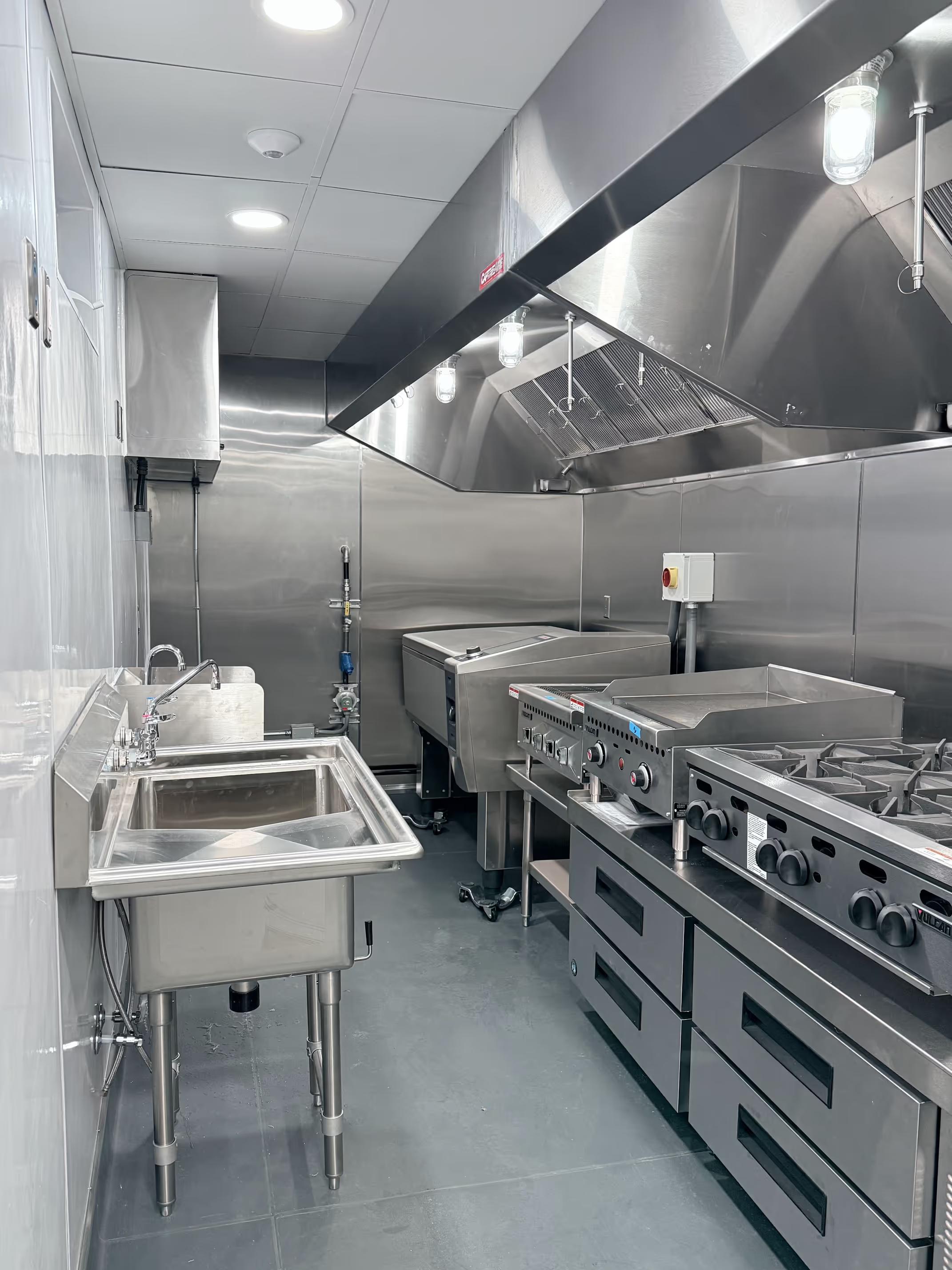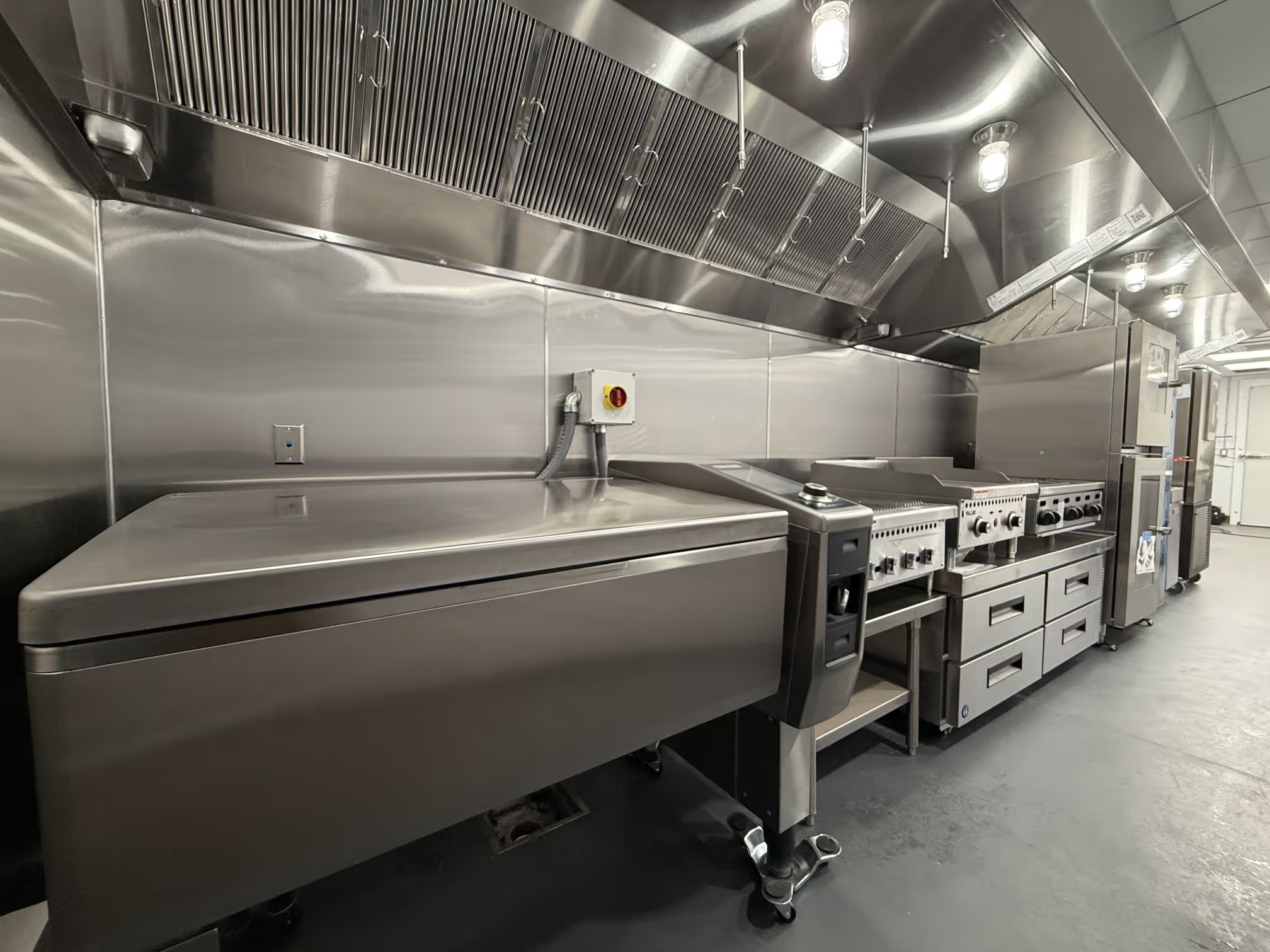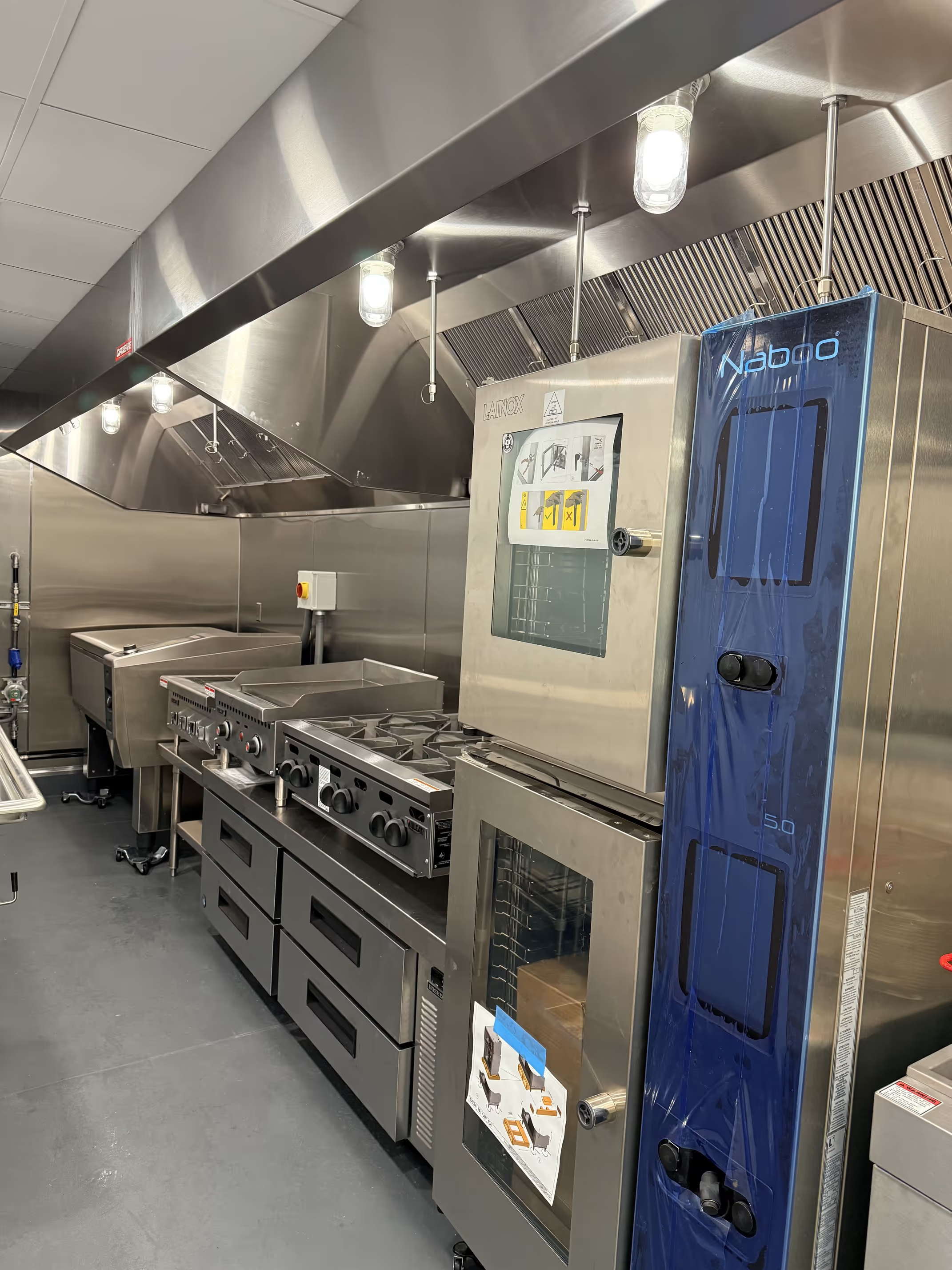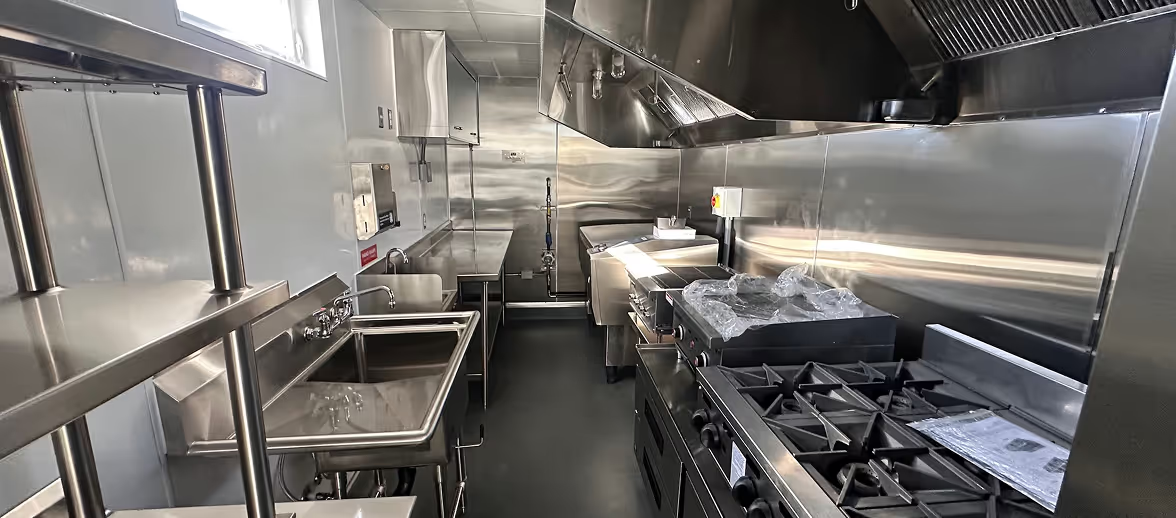.jpeg)
Introduction
Did you know the mobile kitchen trailer industry is projected to surpass $7.8 billion by 2032? As construction costs soar and seasonal demands intensify, hospitality leaders are rethinking how to keep kitchens running without compromising guest experience.
Imagine this: your resort is undergoing a kitchen renovation right before peak season. Downtime isn't an option. That’s where mobile kitchens come in. These high-performing trailers offer the functionality of permanent commercial kitchens with none of the disruption.
In this article, we’ll explore the key features, benefits, and use cases of mobile kitchen trailers, including what to consider when choosing one, cost comparisons between rental and purchase, and why Mobile Culinaire is a leader in the mobile food trailer space.
What Are Mobile Kitchen Trailers?
Mobile kitchen trailers are self-contained, fully operational commercial kitchens installed inside mobile units. These trailers come equipped with professional-grade appliances, plumbing, HVAC systems, and storage, all built into a transportable format.
What are the Components of a Mobile Kitchen Trailer?
- Trailer: ISO shipping containers on chassis trailers are commonly used for their durability and mobility. Other types include cargo trailers, concession trailers, Airstream trailers, and Step Van Trucks. Each has pros and cons regarding efficiency, performance, and durability.
- Kitchen Equipment: Includes cooking, refrigeration, preparation, storage, and dishwashing equipment found in permanent commercial kitchens.
- HVAC: OSHA ventilation standards require proper HVAC systems for employee safety and kitchen health.
- Add-ons: Electric generators, ramps (for ADA accessibility), grease traps, wastewater tanks, and pre-installed propane and water tanks may be needed.
%2520(1).jpeg)
What are the Main Benefits of Using a Mobile Kitchen Trailer?
Flexibility and Mobility
Mobile food trailers can be deployed anywhere, from bustling festivals and weddings to disaster zones and remote hospitality sites. Their transportable nature allows businesses to serve food wherever it’s needed, enabling agile operations across diverse venues.
Cost-Effectiveness
Building a traditional commercial kitchen can cost between $50,000 and $500,000. A mobile kitchen trailer offers a more budget-friendly alternative with significantly lower startup and operational expenses, making it ideal for temporary or seasonal culinary needs.
Speed to Market
While fixed kitchens often require 6 to 12 months of construction, mobile kitchen rentals can be delivered and operational in days or weeks. This rapid deployment enables businesses to start serving customers faster and adapt to new opportunities.
Versatile Usage
From catering private events and managing food operations during renovations to launching a pop-up restaurant or seasonal food concept, mobile kitchen trailers are incredibly versatile. They can support both short-term needs and long-term deployments up to 2–4 years.
Reduced Business Risk
A mobile kitchen for lease is perfect for testing new foodservice concepts without the high capital investment of a brick-and-mortar location. This flexibility helps businesses experiment with new ideas or locations while minimizing financial exposure.
Business Continuity
Unexpected disruptions like construction, facility upgrades, or emergencies can halt operations. A commercial mobile kitchen ensures your culinary service remains uninterrupted, preserving customer satisfaction and revenue.
Environmental Impact
Compared to permanent kitchen builds, mobile kitchens generate significantly less construction waste. With options to incorporate energy-efficient appliances and sustainable materials, they offer an eco-friendly approach to modern foodservice.

What are the Main Use Cases for Mobile Kitchen Trailers?
Event Catering
Mobile kitchen trailers are ideal for catering weddings, festivals, concerts, and sports events. Their mobility and full-service capabilities allow chefs to deliver fresh, high-quality meals on-site, regardless of the location.
Emergency and Disaster Relief
A mobile kitchen for rent is a crucial asset during natural disasters or emergencies. Organizations like FEMA use mobile kitchens to ensure communities, first responders, and volunteers receive consistent, nutritious meals in crisis zones.
Film and TV Production Sets
On remote sets, a mobile kitchen trailer offers a reliable food service solution. Cast and crew can enjoy meals on-site without interrupting production schedules, ensuring efficient and uninterrupted filming.
Construction and Renovation Projects
When a business’s primary kitchen is under construction, mobile kitchen trailers help maintain foodservice operations. They provide a seamless and code-compliant solution to avoid disruptions.
Seasonal Operations and Pop-up Restaurants
Entrepreneurs can launch seasonal pop-ups using mobile food trailers in parks, beaches, or ski resorts. These trailers help test new culinary concepts and expand brand reach with low financial risk.
Hospitality
Luxury hotels and resorts rely on mobile kitchen trailers during renovations or high-traffic periods. These units help maintain high culinary standards and support event catering in outdoor or overflow spaces. The CDC also emphasizes the importance of food safety during such expansions.
Corporate Dining
Mobile kitchens support food service for corporate events, training retreats, and large meetings. Their flexibility allows companies to provide on-site dining with ease and professionalism.
Education and Healthcare
Schools, universities, and hospitals use mobile kitchen rentals during kitchen remodels or special functions. This ensures uninterrupted foodservice and compliance with dietary and health regulations.
Military and Government
Military bases and government events often use mobile kitchen trailers to feed large groups. Their ability to be deployed quickly and meet strict regulatory standards makes them a dependable option.

What Factors Should You Consider When Choosing a Mobile Kitchen?
Size and Capacity Needs
When evaluating mobile kitchen trailers, consider your required foodservice volume. These commercial mobile kitchens typically range from 256 to over 900 square feet and can support the production of up to 600 meals per day. For higher outputs, a custom mobile kitchen solution may be necessary.
Length of Use
Determine how long the unit will be needed. A mobile kitchen for lease is well-suited for temporary use ranging from 3 to 24 months. Ideal scenarios include construction renovations, peak season demand, or testing a new service model. For longer-term operations, purchasing a mobile kitchen trailer may offer better value.
Usage and Application
Not every mobile food trailer fits every use case. If your menu is complex and equipment-heavy, ensure the layout and features support your culinary needs. Mobile kitchens are best for streamlined menus or standard foodservice operations.
Permits and Code Compliance
Mobile kitchen trailers must meet local, state, and federal regulations. Required permits often include a valid business license, a food handler's permit, fire marshal clearance, and ADA compliance features. For health and fire safety requirements, refer to the NFPA and local authorities.
Budget Considerations
Your mobile kitchen rental or purchase budget should include more than base costs. Factor in additional expenses such as site prep, utility hookups, delivery fees, insurance, ramps, and code inspections.

Which is More Cost-Efficient: Rental vs. Purchase?
Renting a Mobile Kitchen Trailer
A mobile kitchen for lease is an ideal solution for short-term or seasonal needs. Rental prices typically range from $5,000 per month for compact models to $50,000 per month for fully customized, large-scale units. Mobile kitchen rentals are especially beneficial for events, temporary relocations, and renovations where speed, mobility, and lower upfront costs are key.
Opting for a mobile kitchen rental provides the flexibility to adjust to demand without the long-term commitment. It's also ideal for testing new concepts or accommodating short lead times, making it a popular choice among hospitality businesses and institutional operators.
🔹 Note: At Mobile Culinaire, we offer several size options that range from 30' to 2x53' that can best suit your specific needs.
Purchasing a Commercial Mobile Kitchen
Purchasing a mobile kitchen trailer is a long-term investment, best suited for operations that require permanent or semi-permanent foodservice setups. Prices start at around $50,000 for basic models and can go up to $500,000 for premium trailers with advanced equipment and build quality.
Ownership allows for full customization of layout, appliances, and finishes to match your operational needs. However, buyers must be prepared for higher initial costs, ongoing maintenance, and greater logistical responsibility compared to rentals.
%2520(1).jpeg)
Why Choose Mobile Culinaire for Your Temporary Foodservice Operations?
Built In-House for Superior Quality
Our mobile kitchen trailers are not outsourced. We engineer and build every unit ourselves, overseeing the full manufacturing process. With more than 400 units produced to date, this in-house approach guarantees rigorous quality control and ensures each unit delivers exceptional performance, durability, and reliability in the field.
Expertise That Makes a Difference
Mobile Culinaire isn't just a vendor, we're specialists. Our deep-rooted knowledge in mobile kitchen trailer systems allows us to serve a diverse range of hospitality clients with confidence. We understand the nuances of fire codes, health regulations, and spatial constraints, making compliance straightforward and operations seamless.
A Hassle-Free Rental Experience
We prioritize making your rental experience as smooth as possible. From your first inquiry to final setup, every phase is carefully managed for efficiency and clarity. Our process is designed so you can stay focused on delivering an outstanding food service experience, while we handle all the logistics behind the scenes.
Conclusion
In a competitive hospitality landscape, the ability to serve guests without compromise, regardless of renovations, expansions, or emergencies, is critical. A mobile kitchen trailer provides a turnkey solution to maintain performance, quality, and compliance.
Whether you need a temporary kitchen during peak season or are testing a new food concept, Mobile Culinaire’s commercial mobile kitchens are engineered for excellence. Explore our mobile kitchen rental options or contact us to tailor a solution to your project.
%2520(1).jpeg)
People Also Ask (FAQ)
What is a mobile kitchen trailer used for?
A mobile kitchen trailer is a fully equipped kitchen on wheels, used to prepare and serve food in locations without permanent kitchen facilities. It’s commonly used at large events, construction sites, disaster relief zones, and film sets. These trailers allow chefs and staff to operate efficiently anywhere. They provide a convenient and compliant way to serve fresh meals on-site.
How is a mobile kitchen trailer powered?
A mobile kitchen trailer is usually powered by a combination of external electricity, onboard generators, and propane or natural gas. When available, trailers are plugged into the local power grid or a building’s electrical system to run appliances like refrigerators, ovens, and lights. In remote or off-grid locations, built-in generators provide the necessary power for full operation. Propane or natural gas tanks are commonly used to fuel cooking equipment, reducing the electrical load. This flexible setup allows mobile kitchens to function efficiently in a wide range of environments, from urban job sites to outdoor events or emergency zones.
Do I need special permits to operate a mobile kitchen trailer?
Yes, operating a mobile kitchen trailer usually requires specific permits and licenses, which can vary by location. Common requirements include health department permits, business licenses, and fire safety inspections. It’s essential to consult local regulations to ensure compliance before commencing operations.
Testimonial

"What is standing out when you look at the mobile kitchen operation is the efficiency that we can really achieve because it's built for that."
Tell us about your kitchen needs and request a quote.
.png)
Turnkey mobile kitchen
.png)
Proudly made in-house in the USA
.png)
Commercial grade kitchen equipment
.png)
Code-compliant
Trusted by Industry Leaders




.gif)

%20(1).avif)
%20(1).avif)
%20(1).avif)